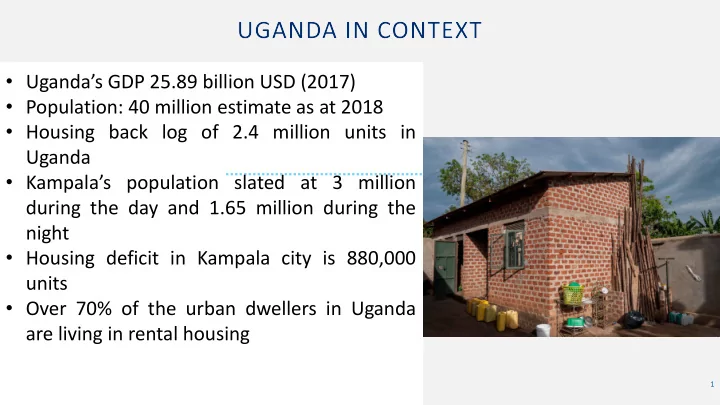

• Uganda’s GDP 25.89 billion USD (2017) • Population: 40 million estimate as at 2018 • Housing back log of 2.4 million units in Uganda • Kampala’s population slated at 3 million during the day and 1.65 million during the night • Housing deficit in Kampala city is 880,000 units • Over 70% of the urban dwellers in Uganda are living in rental housing 1
2 • The National Shelter & Housing Strategy (1992) • The National Housing Policy (2016) • The Constitution (1995) • The National Urban Policy (2017) • The Physical Planning Act (2010) • The Building Control Act (2013) • The Land Act (Cap 248) 2016 • The Slum Upgrading Strategy (2008) • The Land Acquisition Act (Cap 226) Launch of NHP after close to • The Mortgage Act (2009) 30 years without a relevant • The Condominium Property Act (2012) sector policy framework • The national building codes and standards (2018) • The Landlord and tenant bill/act (2018) 75% 75% 25% 25% 50% 50% 87% 87%
• Issue of implementation remains a challenge – resource allocation (manpower, finance, institutional structures etc.) • Commodification of land coupled with speculation characterises land markets, arising from vested interests amongst different key actors in land and housing sector • Inadequate regulatory and institutional frameworks for real estate development and management • Land values continue to appreciate and spiral out of control • Low income HHs are vulnerable as they are pushed into marginal lands • Urban sprawl development complicating urban governance and service delivery • The few low and middle income HHs with capacity to access housing finance fear losing their assets • Housing on the real estate markets by NHCC and other private real estate developers remains expensive • Lack of coordination between public sector offices as well as the private sector • Few products available for incremental housing and financing with very little government support 3
OPPORTUNITIES • Using the housing economic value chain to influence policy change and government thinking: • Landlord and tenant bill • Real estate policy • Lobby for sector coordination and alignment of National Development Plans • Increase focus on rental housing as it is a major economy driver in Uganda • Security of tenure reforms: interacting with formal and informal institutions of land • Building a case for incremental housing finance targeting both the formal and informal sector • Facilitate process of data collection involving the informal sector • Formalization of construction processes beyond the formal sector 4
Recommend
More recommend